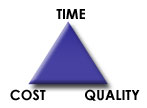Sometimes we all get caught up in the whirlwind and forget about the bigger picture. The bigger picture for a QA professional is software quality. Now that we got that out of the way, let me remove my captain obvious ball cap and give you some straight talk.
How many times have you been caught up in the weeds of something that truly doesn’t improve the quality of the system you’re implementing? Drawing from a recent project I was on, I noted the incessant need of people throughout organizations to feel significant, which can derail a QA professional’s focus. People need to feel significant at work. I am not speaking of the testers on your project, or the solution/requirements lead that you’re working alongside – although they have needs too. I am speaking about the functional managers and stakeholders who will voice their opinion without all the facts. Their need for the feeling of significance is much higher when they can’t get their minds around the complexity of a solution or a paradigm shift in conducting electronic business. These types of people are quick to speak up in meetings without all the facts. Their vehicle to fulfill their need of significance is to openly express their opinion without documented facts to back up their sentiments. Before you label this person as a roadblock, take the time to step back and think about the situation at a project or organizational level.
Respect Everyone’s Vehicle to Achieve Significance
It is my belief that everyone (including you) has a vehicle to achieve significance in the workplace. Our job as QA professionals is to gather information and present our findings. The very nature of our analytical minds is what drew us to the QA field in the first place! Our vehicle to achieving significance on the job is our continual focus on quality. We know how important it is to ensure that all system requirements pass an ambiguity check — a component of realizing a quality solution. Quality is our prize, but not everyone’s prize.
As QA professionals, we need to respect every individual’s “prize” on the project team. We value information, facts, and above all – quality. Others on the project team may place more value on time allocations or protecting their position within an organization. The lesson I’ve learned in recent years is that we need to respect each other’s perspective while knowing our lot within an organization. Our desire to achieve the highest level of quality may conflict with the interests of other individuals on the overall project team. We should anticipate this ahead of time, but make a conscious decision to never take our eyes off our prize — quality.
Competing Interests: Cost, Quality, and Time

In the end, a compromise is usually struck between cost, quality, and time. The conflicts that arise throughout the systems development lifecycle are typically because we lose sight of our end goals. We get caught up in the emotional whirlwind of deadlines, emails, and endless meetings. Conflict and stress melt away when we make a deliberate effort to re-focus our minds on the end result we’re aiming to achieve together as a project team.
Our QA-centric minds desire quality at every turn in the systems development lifecycle. However, we must keep in mind that there is a balance that needs to be struck with other competing interests that may interfere with our quality-centric needs. Whether the overall project goal is customer satisfaction, or increased market share – your awareness of competing interests will make you a much more effective QA manager (not to mention a much more relaxed and ‘easier to be around’ QA manager!).
My prize will always be quality. The good news is that it is not our job to strike the balance between cost, quality, and time – that’s what project managers are for! Our job is to present the facts of our findings, while also recommending measures to mitigate risk that may eventually impact the quality of the solution we are responsible for delivering. Our higher-level awareness of competing interests is what facilitates the harmonious balance that every successful IT project lifecycle achieves.
About the Author
Matthew Angerer Mr. Angerer is a versatile, innovative, results-oriented QA Architect with over a decade of experience in enterprise, mission-critical systems implementation, and support for large entities including Unilever HPC, Defense Logistics Agency, Nationwide Insurance, Honda Motors, Tory Burch, SM Energy, Imperial Irrigation District (IID), Wisconsin Public Services Corporation, and Mettler-Toledo, Inc. He has solid expertise in SAP ECC and CRM software quality assurance, business process analysis, full lifecycle software development, large-scale software integration, interface design/testing, and Independent Verification and Validation (IV and V) methodologies. He successfully rolled out SAP Testing Center’s of Excellence (CoE) from the ground-up with 10 full-time resources supporting the global testing needs of organizations and reporting directly to him. Matt is an HP Certified Professional in Quality Center and QuickTest Professional, as well as an IBM Certified SOA Associate. He is an HP ALM Solutions Architect for ResultsPositive and can be reached at mangerer@resultspositive.com.
